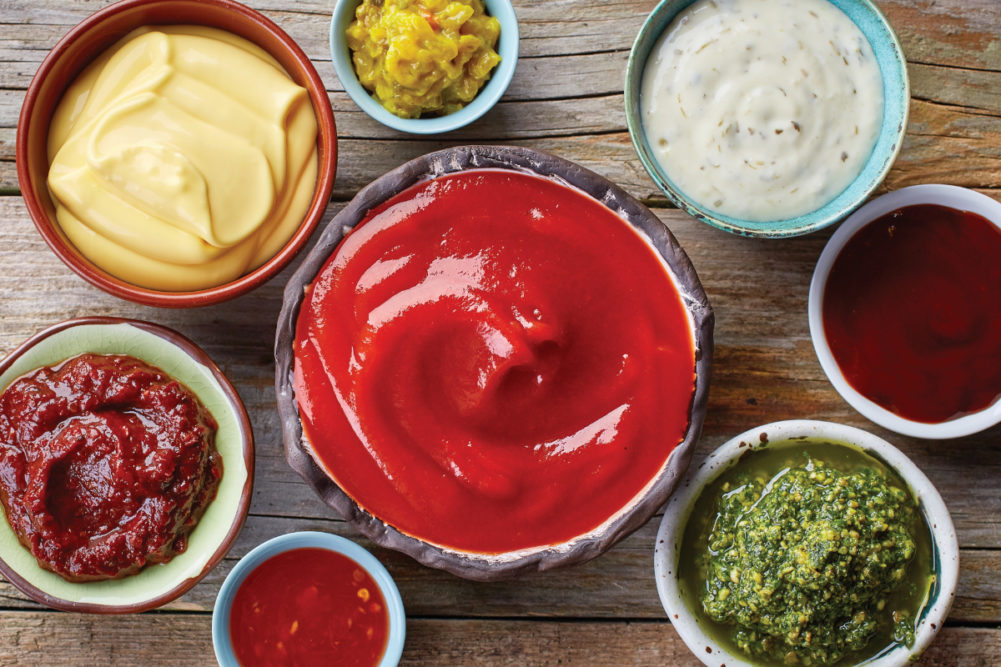KANSAS CITY — As supermarkets heighten the focus on convenience with a host of prepared and ready-to-eat meal solutions, condiments and dressings are becoming a staple for the instore deli.
“Supermarkets have now become a destination for more than just ‘food shopping’ but instead, they have significantly evolved and have become more convenience focused, developing popular pre-packaged grab and go items from soups, salads and sandwiches to sushi and hot bars,” said Deborah Sidney, senior brand manager for Linden, NJ-based Walden Farms. “Consumers look for a wide array of condiments/dressings merchandised in these areas to use and try new items; this ultimately builds shopper engagement and increases trial and shelf take away.”
As the last year has pushed more consumers to eat in the home, the refrigerated salad dressing category saw double-digit growth of 11.7% in the 52 weeks leading up to April 18, 2021, and hit a record-setting $500 million in sales, said Chris Blanford, Sandpoint, Idaho-based Litehouse Foods’ vice president.
“This growth can be attributed to a rise in at-home meal consumption where consumers are using dressings for a variety of occasions throughout the day,” Blanford said. “There are opportunities to cross merchandise throughout the store, including the deli department where our dressings are a delicious pairing for pizza, wings, sandwiches and more. Because of their versatility, our refrigerated dressings are great for cross-merchandising across different refrigerated retail departments.”
Classic and ethnic flavors take the floor
As with many categories over the last year, classic and familiar flavors took up the largest basket share in the condiment and dressing segments over the last year. For Litehouse Foods, the company’s Ranch, Blue Cheese and Caesar refrigerated dressings saw the biggest increase in 2020.
Late last year, Litehouse debuted two new flavors: Hatch Chile Ranch and Sesame Miso.
“Flavored Ranch dressings, like Jalapeno Ranch and our new Hatch Chile Ranch, are a top performer in the refrigerated salad dressing category, and address consumer demand for a classic flavor with a twist,” said Blanford. “Asian flavors have seen nearly a 10% growth in the natural condiments, dressing and marinade category (Technomic 2018 & 2019 l SPINS Total US Attribute Study May 2020). We developed Sesame Miso to provide consumers with a versatile product in a trend-forward flavor that can be used a variety of ways, including as a dip for pot stickers and egg rolls or as a marinade for salmon and chicken.”
For Walden Farms, Sidney said the company’s Thousand Island, Honey Dijon, Ranch, Raspberry Vinaigrette and Chipotle Ranch are among top selling dressings. Walden Farms’ Original and Thick & Spicy Barbecue Sauces are also top sellers for consumers looking for bold taste.
"Walden Farms dressings are perfect paired with sandwich types like Thousand Island or Russian for a Reuben, Bacon Ranch or Creamy Bacon is delicious drizzled on a turkey sandwich or wrap and our Balsamic Vinaigrette is delicious on a grilled chicken sandwich with roasted peppers and fresh mozzarella,” said Sidney. “In the prepared foods section, Walden Farms Honey Dijon, Blue Cheese and Ranch partner with wings and chicken nuggets and are ideal for crudité platters.”
A focus on healthy
Post-pandemic, Sidney said Walden Farms is seeing strong product sales as people are getting back to their routines, focused on their health and wellness goals and losing extra weight they may have gained during the lockdown period.
“Both Vegan and Keto friendly options along with Carb Free and Calorie Free attributes appear to be resonating more with consumers over the past year as they continue to manage their health and wellness goals through lifestyle diet trends and looking for better-for-you options,” she said.
Walden Farms offers a full line of specialty condiments and food enhancers free from artificial flavors and dyes, and made with real vegetables, fruit fibers and ingredients. With zero calories, zero net carbs, zero sugar and zero fat, the dressings appeal to all types of consumers — those who don’t want to waste their calories on high fat dressings and condiments, or who follow a vegan, gluten-free or keto diet. They also resonate with people living a healthy lifestyle or looking to manage weight or control diabetes.
Blanford noted that consumers are increasingly seeking out products with claims like “no added sugar” and “no additives or artificial preservatives,” which has driven the release of Litehouse’s latest products:
- Green Garden branded plant-based dressings, dips and mayos that are non-GMO, vegan and gluten-free.
- Litehouse Purely Balanced — a Greek yogurt-based refrigerated salad dressing that is an ideal choice for consumers trying to meet specific dietary needs with 45 calories per serving, 0g of added sugar and no artificial colors, flavors, preservatives or sweeteners, while still delivering on great taste and high quality.
Blanford encourages retailers to give customers ideas for healthy meal options through cross-merchandising.
“Being able to show versatility and usage occasions can help increase purchase intent. Retailers should consider creating a secondary display as a one-stop shop that pairs condiments or dressings with other related products,” he said. “For example, creating a date night at-home display with dressings, fresh produce, a protein and dessert can help inspire ideas and increase basket size.”

